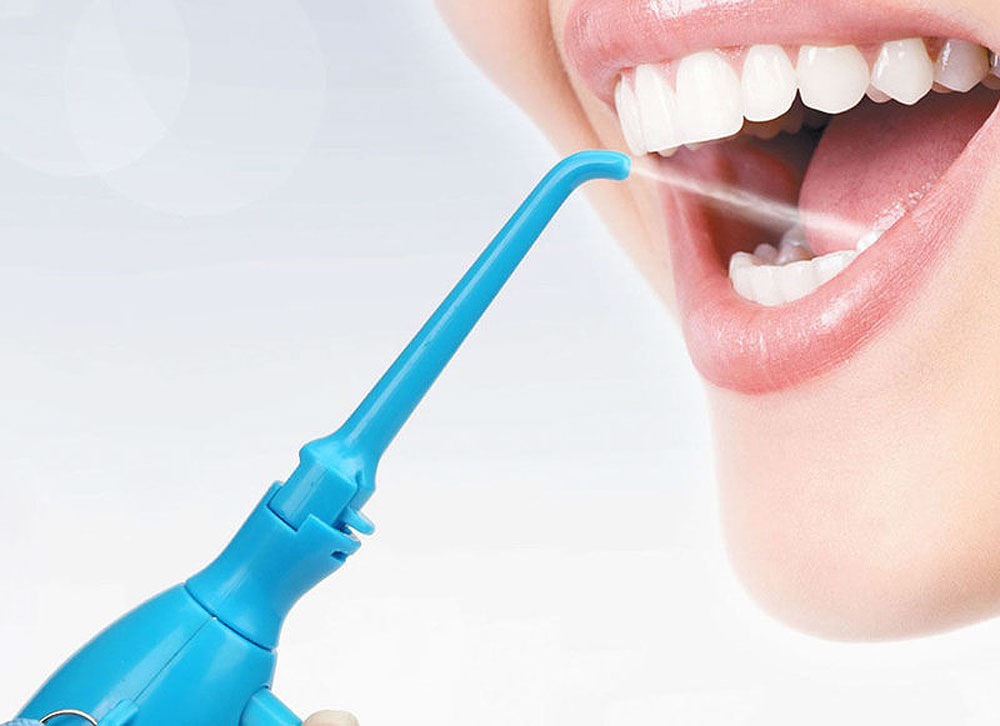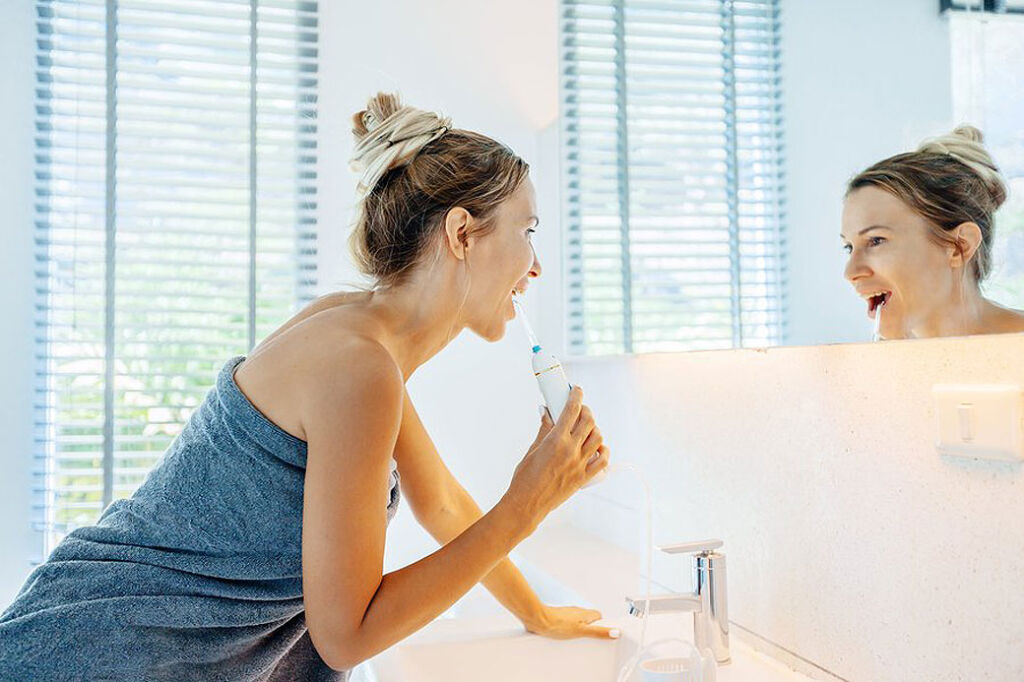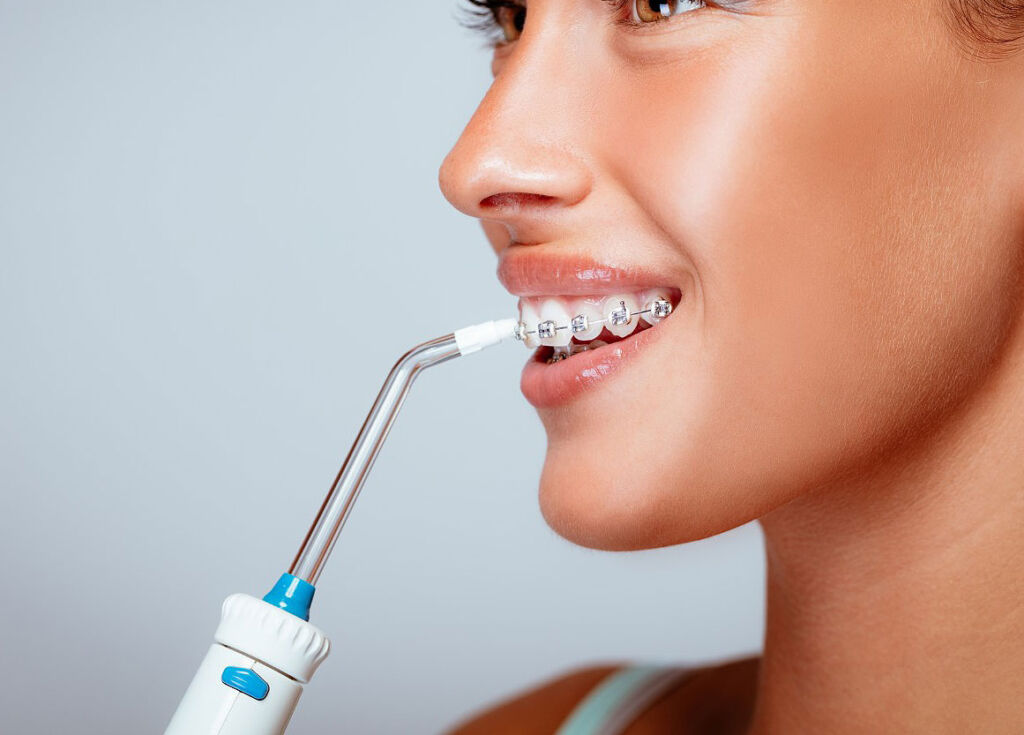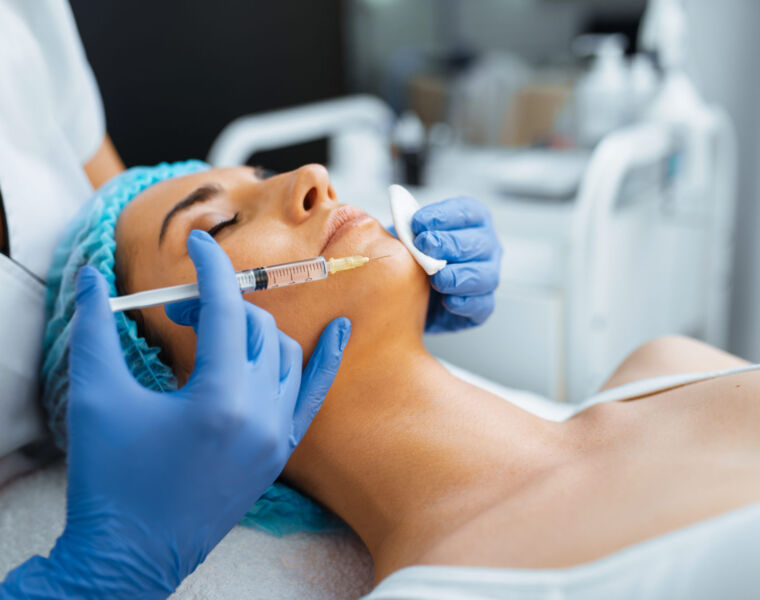
The majority of people’s experience of water flossers is limited to a visit to the dentist. However, over recent times and particularly during the lockdowns, more and more of these amazing devices are finding their way into people’s homes. In this health feature, Renata Lainchbury explains to us what they do, and more importantly, the fantastic benefits of using one.
The events of the past eighteen months have caused many people to forgo a trip to the dentist, which no doubt will result in a backlog of dental-related problems when life fully returns to some semblance of normality.
Too many people are lazy when it comes to their oral health, thinking that a branded toothbrush, a well-known toothpaste stating it is the cure for everything, and a quick gargle of mouthwash in the morning and at night is enough; it’s not!

Good oral health is vital. Most people probably don’t realise just how wide a range of negative impacts poor oral health can have on the body; you can read an insight into this here.
If you want to improve your oral health, there are no better people to learn from than those who work at a dental surgery. Fortunately, with technological advances, some of the tools dentists and hygienists use are starting to find their way into people homes. Last year we started using the Silk’n ToothWave, a toothbrush that uses patented DentalRF technology similar to that found in dental surgeries, it’s been a revelation, and you can read why here.
However, if there is a single, straightforward ‘magic bullet’ regarding oral health, it’s the water flosser. It stands to reason that many people reading this will already floss, but if we’re all being honest, it can be somewhat of a pain with snapped threads, tricky places to get to, bleeding gums etc. Water Flossers do much the same job as flossing thread, i.e. keeping your teeth and gums healthy. The big difference with a water flosser is it does the job minus the hassle.
Below, Renata Lainchbury, a Dental Hygienist at Ipswich Dental Surgery explains to us everything you’ve always wanted to know about water flossers.

Luxurious Magazine: What is a water flosser?
Renata Lainchbury: A water flosser (an oral irrigator) is a device that shoots a stream of water between your teeth and gums and works to remove any food debris, bacteria and plaque from the pesky areas in-between your teeth that are hard to get at with regular floss.
The best oral irrigators feature a number of different settings, so you can adjust the water pressure to suit your mouth and sensitivity. They’re a super gentle yet effective way to clean around the teeth, braces, dental implants and crowns without damaging any of these areas. People who would benefit most from purchasing a water flosser are those who struggle with dental floss.
Flossing is an effective way to remove food particles from teeth; however, if a person rushes the process, they could cause damage to their gums from aggressive flossing.
Improper flossing can cause gum tissue damage. Water flossers are much gentler and less focused on technique. They also don’t require you to put your hand inside your mouth or deal with the awkwardness of string floss, as they only use water to remove food. In some instances, they are more effective as they are somewhat quicker and hassle-free and can be used each morning and evening.

LM: Are there different types of water flossers?
RL: There are a few different types of flossers you can get—a countertop version, which sits on your counter and plugs into a nearby socket. There are also cordless or battery-operated, which provide great flexibility for those who travel or who want to floss on the go. Another type is a shower flosser that attaches to your showerhead and a faucet, which is the most common type and similar to the shower flosser but uses a cord that attaches to your sink as opposed to your shower.
Most water flossers offer adjustable pressure settings, making them ideal for those who suffer from sensitive gums or implants. This allows the water to continue to clean out the mouth without harming the gums.
LM: Who should use a water flosser?
RL: Water flossers should not be used as a substitute for brushing and flossing, but they are a great tool to add to your dental routine. There are a few people who would benefit most from a water flosser. In particular, those with bleeding gums. Flossing too hard can cause bleeding gums, so oral irrigators are a great alternative to this.

When you have braces, it can be incredibly hard to reach every bit of debris stuck within the braces and underneath the wires. Water flossers reach those areas where food particles tend to hide; it also manages to remove plaque in areas that they would normally sit due to not being able to reach with a brush or floss.
Saliva naturally cleans your mouth and prevents and plaque build-up. Many people do not produce enough saliva naturally, promoting gum issues and cavities, so an oral irrigator is a good way to add moisture to a dry mouth and remove any stubborn plaque. If you are prone to having food stuck in your teeth, this is also a great option for you.
Many people often have food stuck in their teeth after eating, which is usually because of the shape of their teeth or because they are not properly aligned. It is not only annoying for the person but can promote dental issues if the food is left for hours without being removed.”
LM: What do you need to look for in a water flosser?
RL: When shopping for a water flosser, you have to consider your lifestyle and the type of flosser you are looking for. For example, a cordless battery operated flosser may be your best bet if you travel a lot.
Luckily most flossers have adjustable water pressure, so they should suit all needs of a person. However, there are larger flossers and smaller, more portable flossers, so it really depends on which will suit you best.
Most people will use a standard flosser that can be plugged into a socket in the bathroom and will sit on the side of the bathroom shelf next to your toothbrush or stored away in a cabinet.
Flossers can be quicker and easier than flossing; however, they should not replace flossing or brushing and should simply be an addition to a routine. If you find you are super busy in the morning, then they may work for you like the stream of water can clean out any debris in a matter of seconds as opposed to flossing which can be a little more technique focussed.

![]()




You must be logged in to post a comment.